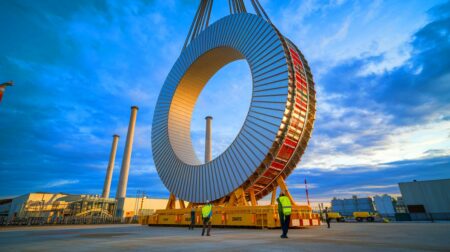At the COP25 gathering earlier this month in Madrid, Africa’s nations were urged to seek out climate-conscious solutions to the challenges of continued economic development on the continent. As thousands of East Africans are suffering the effects of extreme weather events in the region, the need to find an effective response to climate change has never been more pressing.
Africa has already demonstrated its commitment to change: 51 of 54 African countries have ratified their climate change targets – Nationally Determined Contributions (NDCs) – under the Paris Accord. Ambitious renewable initiatives are being deployed, too. ‘Desert to Power’ is a $20 billion venture that will roll out solar energy installations across the Sahel region, designed to provide around 250 million people with clean electricity.
Powering growth and development
Despite the progress so far, it’s unlikely that the continent’s energy needs can be met by renewables alone. The 48 countries in sub-Saharan Africa generate an amount of power roughly equivalent to that of Spain – despite a population 18 times larger. World Bank data shows that almost six out of ten people living in this region lack access to electricity. In the face of rapid population growth and mounting international pressure to tackle climate change, ramping up energy production while keeping a lid on greenhouse gas emissions is a tricky balance to achieve.
Huge investments have been made in harnessing hydro, wind and geothermal sources: the continent’s flagship Grand Renaissance Dam on the Nile is projected to deliver 6,000 MW when completed. But as droughts become more frequent, there are concerns about an over-reliance on a continued abundance of water for a key electricity source. Water levels at Kariba Dam in Southern Africa are at the lowest in years.

Combining renewables with nuclear power, however, makes the task of powering Africa’s growing economies more viable – not to mention the other useful and often overlooked aspects that nuclear can contribute to development. Although South Africa is the only country on the continent currently operating a nuclear power plant, the technology is being increasingly considered by African leaders. For example, works are set to begin on a new 4.8GW plant in El Dabaa Egypt next year, which is being developed by Russia’s Rosatom.
Other countries including Ethiopia, Zambia, Nigeria and Ghana also have memorandums of understanding with Rosatom that pave the way for nuclear development. South Korea are also looking to invest in the continent’s energy industry, while Chinese nuclear firms have entered into agreements with Kenya, Sudan and Uganda. Energy is a key driver for development. In Ghana, for example, nuclear is seen as the obvious way to provide reliable energy for bauxite refineries which would increase jobs and export capacity.
Technology beyond electricity
But nuclear technology provides more than just energy: many advanced nuclear designs produce high-temperature process heat for uses in desalination plants, chemical production and even district heating systems. These subsidiary features would allow nuclear technology to benefit society beyond the generation of electricity – and potentially accelerating its deployment.
Nuclear technologies are already being used in agriculture, for example, where isotopes and radiation techniques are harnessed to combat pests and diseases or to increase livestock and crop production. For instance, farmers in Benin have increased their maize yields by 50 percent, while simultaneously reducing the amount of fertiliser used by 70 percent, thanks to the deployment of nuclear-derived nitrogen-fixation methods – the same techniques that are allowing Maasai farmers in Kenya to double vegetable crop yields with half the irrigation of traditional methods.

Releasing sterilised male insects – using the nuclear-derived sterile insect technique – into pest-infested areas to suppress and eventually eliminate insect species has proved highly effective. Yet is safer for the environment and human health than conventional pesticides. Wider applications include improving food safety by detecting contaminants in food products and beefing up traceability systems with stable isotope analysis.
It’s estimated that a fifth of the world’s population has no access to safe drinking water – a figure that’s certain to increase as populations grow and global freshwater sources decline. UNESCO predicts that a shortfall in freshwater supplies could hit 500 trillion gallons per year by 2025. In drought-stricken regions, freshwater production through nuclear desalination can be a cost-effective solution. Desalination by reverse osmosis or evaporation uses huge amounts of – often expensive – energy.
By contrast, nuclear desalination could use the excess heat from new reactor designs like Small Modular Nuclear Reactors (SMRs) to produce thermal and electrical energy without emitting greenhouse gases, which then transforms seawater into freshwater. While capital costs for nuclear plants are initially high, fuel costs are low and stable: a doubling in the price of uranium would result in only a five percent increase in the total cost of energy generation. In contrast, an equivalent increase in oil would cause freshwater production costs to surge by 70 percent.
Finding a way forward
Although nuclear power offers a carbon-neutral option for Africa’s nations, some challenges need to be overcome for nuclear to become a norm in the region. It requires a high-level of investment and the costs involved in bringing the infrastructure up to speed in certain areas should not be underestimated.
No wonder that African countries have demanded “special consideration” at COP25 going forward in their development. Developed countries with nuclear expertise could include financial assistance for such energy projects in their efforts, given that gaining access to large amounts of cheap electricity from nuclear plants that run without interruption could be the key to boosting domestic manufacturing and quality of life.
With the mitigation of climate change at the top of the agenda, nuclear could be an important option for a continent in dire need of cost-effective, clean and reliable electricity to power growth and development in its rapidly expanding economies.
Did you like it? 4.5/5 (26)








